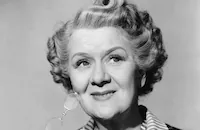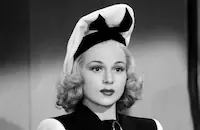Pillow to Post

Brief Synopsis
Cast & Crew
Vincent Sherman
Ida Lupino
Sydney Greenstreet
William Prince
Stuart Erwin
Johnny Mitchell
Film Details
Technical Specs

Synopsis
After hearing a call for women to join the work force and replace the men who are now in the army, Jean Howard begs her father, an oil supplies manufacturer, to hire her as a traveling salesperson. He reluctantly agrees, but after she loses several sales, he demands that she return from the road. Jean, however, is determined to give the job one last try. Slim Clark, her next prospect, runs an oil field adjoining an army town. The town is crowded with wives visiting their husbands, and Jean believes that she will be unable to find a room. Through a misunderstanding, however, she is offered a bungalow motel room that is available only to a married couple with no children. Upon arriving at the motel, Jean explains that her husband is absent on a bivouac, but agrees to present him to the landlady before 6:00 p.m. The landlady adds to Jean's dilemma by assuming that her husband is a lieutenant in the army. Jean pays a visit to Slim at the oil field, and he refuses to close the deal until she accepts his dinner invitation. In order to stay, Jean now must find a lieutenant to pose as her husband. Just before her 6:00 deadline, she gets a ride from Lieutenant Don Mallory, who agrees to sign the register before leaving again for the camp. To his dismay, however, he meets his commanding officer, Colonel Michael Otley, and has to pretend that he and Jean were secretly married that morning. Otley then cancels his assignment so that he can spend the night with his new "bride." Later, when Slim arrives for his dinner date with Jean, Don insists that, for appearances' sake, he must come along. Slim is furious and by the end of the evening, Jean still has not closed her deal. After a great deal of maneuvering, Don spends the night camping outside, while Jean sleeps in the bed. The next morning, Don suggests that he tell Otley that they have quarreled and Jean has returned to her father, but the plan backfires when Otley overhears their fake quarrel and insists that they kiss and make up. Then Slim invites Jean to discuss his offer during a trip to Fresno. Don is furious when Jean returns from the trip, successful but with her lipstick smeared, and leaves the motel. While he is gone, Don's mother arrives unexpectedly. Jean packs her suitcase, intending to leave, but then Otley, who has invited the couple to dinner, tells her that he is demoting a lieutenant on his staff who pretended to be married. Jean decides to stay for dinner in order not to jeopardize Don's career. At the Otleys', Jean, who by now is quite drunk on sherry, manages to bring Don up to date before the Otleys are called away to help deliver a baby in a neighboring bungalow. When Slim comes to take Jean to the train, he finds Don's mother in the cabin, and the two of them confront Don and Jean at the Otleys'. When Jean's father arrives as well, everyone quarrels. Otley, who has returned from the delivery, is about to court-martial Don when Lucille, the handyman, testifies that Don spent the night outside and not in Jean's cabin. Slim, realizing that Jean is in love with Don, says goodbye to her, and Don telephones the local minister to announce that he and Jean will be married.

Director

Vincent Sherman
Cast

Ida Lupino

Sydney Greenstreet

William Prince

Stuart Erwin
Johnny Mitchell

Ruth Donnelly
Barbara Brown

Frank Orth
Regina Wallace

Willie Best

Louis Armstrong

Paul Harvey

Grady Sutton

Don Mcguire
Leah Baird

Joyce Compton

Bob Crosby
Charles Jordan
Anne Loos
Bunny Sunshine
Ferdinand Munier
Diane Dorsey
John Sheridan

Lynne Baggett
Fred Kelsey
James Notaro
Patricia Clarke
Joe Devlin

James Flavin
James Metcalf

Bobby Blake

Marie Blake
Mabel Smaney

Dorothy Dandridge

Carol Hughes
William Haade
Eddy Chandler
Sue Moore
Victoria Horne
Lelah Tyler
Johnny Miles
Marianne O'brien
Colleen Townsend
Anne O'neal
Crew
Milo Anderson
Wesley Anderson
Lew Brown
Alan Crosland Jr.
Gordon M. Davis
B. G. Desylva
Paul Detlefsen
Leo F. Forbstein
Charles David Forrest
Alex Gottlieb
Ray Henderson
Jesse Hibbs
Charles Hoffman
Frederick Hollander
Leo Kuter
Charles Lang
James Leicester
Warren Lynch
E. Kenneth Martin
Jerome Moross
Thomas Morris
Walter F. Tilford
Willard Van Enger
Jack L. Warner
Perc Westmore

Videos
Movie Clip



Trailer
Film Details
Technical Specs

Articles
Pillow to Post
Lupino plays the daughter of the owner of an oil-drilling equipment company. With all the men off to war, she's forced to go on the road as a saleswoman for the company. Stranded in an army-base town, she learns that the only available housing is for military families, so she latches on to a handsome lieutenant and convinces him to pose as her husband. The expected complications ensue. Most critics dismissed the film - Newsweek called it "shopworn" - but Time magazine's resident intellectual, James Agee, proved to have a soft spot for Lupino, if not for the plot, which he dismissed as "corn." But, he added, "corn is edible, and the serious thinkers (Miss Lupino, for that matter, started in comedy) turn out to have a nice knack for foolishness."
Pillow to Post was the third and final film starring Lupino and directed by Vincent Sherman. Their first, The Hard Way (1943), was one of Lupino's best, and earned her a best actress award from the New York Film Critics. The second, In Our Time (1944), was a wartime drama with Lupino playing an Englishwoman married to a Polish freedom fighter.
Lupino's Pillow to Post co-star William Prince, a recent arrival to Hollywood, was also used to weightier roles. He had been a New York stage actor since the late 1930s, and would return to the theater when his film career failed to ignite. His best film role was as Christian in Cyrano de Bergerac (1950), which featured Jose Ferrer's Oscar®-winning performance in the title role. Prince had a long career in theater, in works by distinguished playwrights like Edward Albee and Eugene O'Neill, but was best known for his work in soap operas, from Young Doctor Malone and As the World Turns in the 1950s, to Dallas in the 1980s.
Pillow to Post is notable for a delightful musical number, "Whatcha Say," performed by Louis Armstrong and a young Dorothy Dandridge, almost a decade before she burst into stardom in Carmen Jones (1954). This was the second film in which Dandridge had performed with Armstrong, whom she had known since she was a child performer. According to Donald Bogle's biography of Dandridge, in their earlier film appearance together, Atlantic City (1944), Dandridge's singing "served mainly as a prelude for the arrival of Armstrong.... In Pillow to Post, however...Armstrong just about turns over the sequence to Dorothy, almost as if handing her the gift of prime exposure." Dandridge had more or less abandoned her career when she married dancer Harold Nicholas, of the Nicholas Brothers, in 1942. Although she had recently given birth to a daughter, the marriage was shaky, and the attention she received for Pillow to Post gave Dandridge the impetus to begin working on a nightclub act. After her divorce, Dandridge became a headliner in clubs across the country, and revived her film career. But in spite of her undeniable talent, and an Academy Award nomination for Carmen Jones, film roles for black leading ladies were few and far between. Plagued by personal, professional, and financial setbacks, Dandridge died of an overdose of barbiturates in 1965, at the age of 41.
Director: Vincent Sherman
Producer: Alex Gottlieb
Screenplay: Charles Hoffman, based on the play Pillar to Post by Rose Simon Kohn
Cinematography: Wesley Anderson
Editor: Alan Crosland, Jr.
Costume Design: Milo Anderson
Art Direction: Leo Kuter
Music: Frederick Hollander
Principal Cast: Ida Lupino (Jean Howard), Sydney Greenstreet (Col. Michael Otley), William Prince (Lt. Don Mallory), Stuart Erwin (Capt. Jack Ross), Johnny Mitchell (Slim Clark), Ruth Donnelly (Mrs. Wingate), Dorothy Dandridge, Louis Armstrong (Themselves).
BW-92m.
by Margarita Landazuri

Pillow to Post
Quotes
Love is a beautiful thing.- Jean Howard
I get two hours of it every Saturday night at a movie. That's enough for me.- Lieut. Don Mallory
Trivia
Notes
The film's working titles were Pitfar to Post and Pillar to Post. According to press releases included in the file on the film at the AMPAS Library, Nella Walker was announced for the role of "Mrs. Mallory," and Walter Huston was signed as "Colonel Otley."















